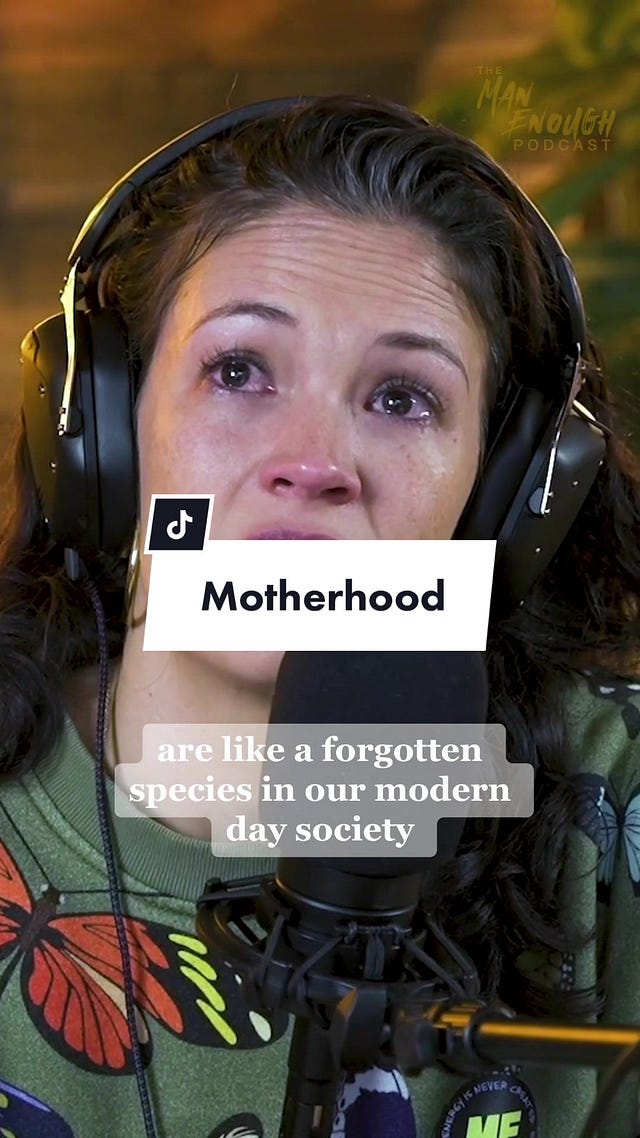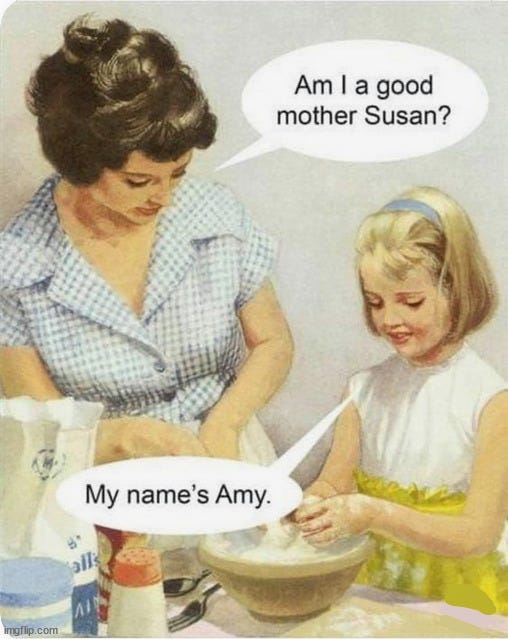Why You Never Need to Feel Like a Shitty Mom Ever Again
Navigating the hellscape of 21st century mothering: where expectations are at an all time high and support is at an all time low. Let's stop blaming the micro for a macro problem.
I originally wrote this article last year, but I still go back and read it when I’m feeling hard on myself for my many mothering imperfections. It’s not us, it’s the system. May we let this concept sink deep into our tired mother hearts.
Would you like to start your day off with a compilation of sad overwhelmed moms?
Cool, I thought so.
I want to talk about motherhood today.
Specifically I want to call out 21st century mothering in America for what it is: a hellscape.
For you high school teachers out there, here is my thesis statement: as mothers, we blame ourselves when we feel like we’re failing (micro level) without realizing just how insane mothering is in this particular time and place in history (macro level).
I find myself ascending this specific soapbox at least weekly in my personal life. When my friend is embarrassed to ask for a therapist recommendation. When another friend breaks down from burn out. When another wonders what is wrong with her that she just can’t seem to meet her kids emotional needs, let alone clean her house, let alone exercise.
Hear me and hear me well: we are living in a unique brand of mothering hell where expectations are at an all time high and support is at an all time low. But we are blinded to it because it’s just the water we’re swimming in.
Let’s go visit some mothering waters in different places and in different times, shall we?
…………………..
Mothering in Other Parts of the World
Two days ago NPR released an article called “Parents aren’t adapted to care for babies alone, new study suggests.” It’s part of a conversation with an evolutionary anthropologist from Cambridge named Nikhil Chaudhary who has spent years studying the Bayaka people in the rainforest of the Republic of Congo.
Here’s a snippet from their conversation:
NIKHIL CHAUDHARY: So you follow a child for a total of 12 hours.
DOUCLEFF: Every 20 seconds, he wrote down details about the child's care.
CHAUDHARY: Who the caregiver was, whether the caregiver was, like, bathing or feeding the child or soothing them or carrying them. So you're just writing that down constantly.
DOUCLEFF: When Chaudhary and his colleagues analyzed the data, they found a striking pattern.
CHAUDHARY: The numbers were really quite amazing.
DOUCLEFF: Each baby had 15 to 20 different caregivers. Many of them simply watched the child. But...
CHAUDHARY: In terms of caregivers who actually are providing hands-on care, the average was about eight.
DOUCLEFF: Eight different people, besides the mom and the dad, bathing, feeding, physically loving the child.1
Like what.
Can you imagine?
Can you even imagine?!?!
FIFTEEN different caregivers? EIGHT different people other than the parents to bathe, feed and love your child on the DAILY??
Meanwhile in America, mothers are begging and pleading for help and support for just ONE other person to help with the kids. My brain short circuits trying to imagine fifteen on a daily basis.
Here are some other excellent quotes from the interview we should let sink deep into our bones:
“Throughout most of human evolution, mothers weren't taking care of babies alone.”
“In Western culture, there's an evolutionary mismatch. We're expected to take care of babies on our own, but humans have evolved to care for babies in another way - that is with lots of help.”
“It’s beyond just the partner. It’s beyond family members. It’s friends, neighbors, older children. This mismatch is a key reason for high rates of postpartum depression in the US.”
“Women are put in this impossible situation where, actually, they're just set up to fail. And then it's not really surprising that a lot of women feel depressed.”
Read those again.
Tattoo those quotes to the back of your eyelids.
Pull them out when you feel like a shitty mother for letting your kids be on the xbox all day.
Pull them out when you’re wondering what is wrong with you for having a messy house.
Pull them out when you’re feeling overwhelmed and assume the answer is more self-control or schedule optimization.
……………………
I remember seeing the waters of American motherhood I was swimming in for the first time (and how they could be different) when I had a friend move to Sweden.
She had four kids like me. Three of them were under the age of five when they moved there. Immediately all three were put in high quality full day, state-funded child care. Their teachers were well trained, well paid and well supported. She felt great leaving her young children in their hands knowing they were getting loving attention, social interaction and healthy meals.
I was so jealous.
I was drowning in toddlerhood. I was drowning alone. I was salivating over what that kind of support would have meant for me.
Oh also she went to grad school there. For free.
The difference in her physical, mental and emotional help between her life in America vs her life in Sweden could not have been more stark. She was thriving.
I noticed the waters again when I went back to Slovenia where I served my mission. I visited a friend I had made there. She had four kids like me. But unlike me, she was able to keep her same job as a teacher without worrying about the time it took away from her kids.
Like in Sweden, she had state-funded full time child care available, but preferred to have her kids at home. She was able to do this and keep her job because in Slovenia for each kid she got one year maternity leave AND the option of working part-time for SIX YEARS without her job being able to fire or discriminate against her for this decision. The fact that she was part time doesn’t even go onto her CV so that future jobs can’t penalize her for being home with her kids.
So since she has four kids, 4 of the past 10 years she’s been totally at home, the rest she’s been working 2-3 days a week. All while keeping her same job that whole time.
My jaw was on the floor.
Can you imagine?
That level of support for mothers?
Meanwhile in America, we remain the only developed country that does not have a national paid parental leave mandate. My friends must BEG their employers for even 7 weeks maternity leave and if they chose to stay at home with their kids longer, they knew that would mean the end of that job. That gap in resume would remain there indefinitely.
………………………..
Mothering in Different Times
Let’s compare mothering now with the times of our mothers and grandmothers.
We’ve come so far as women haven’t we? We are now able to have our bank accounts, upper-level educations and careers.
We have more financial autonomy and opportunity than women in the 1960s certainly, but how about support for mothers?
Journalist Elizabeth Tenety said it well:2
“The truth is that American motherhood has the veneer of being modern, without any of the structures to support our actual lives today.
We have the pressure to work, without the support of paid maternity leave or affordable childcare. The lip service to gender equality, without male partners willing to equally share the load. The recognition that it takes a village, but scorn for women who actually collaborate with a village of nannies, daycare providers and housekeepers…..
In reality, once a woman in America today becomes a mother, our society transports her back in time, to the 1950s. In an instant, generations of sexist ideas and structures descend back upon her. This highly-educated, ambitious woman becomes the default parent, endures the “motherhood penalty”—a financial penalty for her parenthood, and bears the mental load of motherhood.”
So we’re living in this veneer of equality, but in terms of structural support we are in a shockingly similar spot to our grandmothers and great grandmothers.
But in terms of community support? We are far more isolated.
In an interview with her grandmother, Author Jodi Vallee outlines how one Boston suburban neighborhood functioned in the 50s when she said, “My grandmother had the judgement-free support of other mothers in her neighborhood who were all in the same boat as her.”
Her grandmother described her daily life this way:
“The neighborhood was all young mothers and kids… All the mothers and their children would gather on one of the neighbor’s yards each afternoon. The kids would run around and the mothers would talk. They shared cleaning tips and recipes as well as their concerns about their children. They learned about parenting and child-rearing from each other.” 3
Meanwhile these days, if you want to build community as a mom, you must truck yourself over to a mommy-and-me time at the library or really put yourself out there at the park. Not ideal locales for mothers to honestly express how exhausted they are and form tight-knit, long-lasting bonds.
Also, we’re working. We’re busy. Forging ourselves a village is just one more thing on a long to-do list.
So we’re more isolated than ever, but if that wasn’t enough, parental expectations are at an all time high.
71% of mothers work today versus 38% in 1960. You would think mothers in the 60s would spend way more time with their kids since they were home more. But that isn’t true. A recent study found that despite more women working, mothers are spending TWICE as much time tending to their kids now as they did in the 60s.4
“In 1965 mothers spent a daily average of 54 minutes on child care activities, while moms in 2012 averaged almost twice that at 104 minutes per day.”5
Does being more attentive to our kids than past generations were at least earn us some gold stars? No. Over half (56%) of Americans believe that mothers today are doing a worse job than mothers 20-30 years ago.6
Our mothers and grandmothers simply weren’t expected to attend to their kid’s every possible need like we are today. And we judge ourselves according to our heightened standards, not theirs.
So we have more obligations, more expectations and less community support than our grandmothers did.
Knowing this, why on earth would any of us ANY OF US be beating ourselves up for missing a school play or too much screen time?
And yet self criticism pops up in just about every conversation I have with my mom friends (hence the need for my weekly soapbox ascension). We can’t keep blaming individuals for a macro-level failing.
…………………………..
That evolutionary anthropologist was right: rearing a child was never meant to fall on just one individual.
It’s bad enough that it does take a village but we are expected to single-handedly form our own village (some where between orthodontist appointments and making lunches?)
The very least we can do for ourselves is acknowledge how uniquely difficult it is to be a mother in this particular time and place in history.
The least we can do is offer ourselves grace when we fail to meet a few of the 568 expectations placed on us as modern Western mothers.












I LOVE everything about this article and can't wait to share it with all of my mothering friends. This community and support is what we all need, even our children, and we've been sold a bill of goods with nuclear families and "independence." 8-15 extra care givers a day? What?! Free, dependable, high-quality childcare with the opportunity to go back to school for free?! I wonder if our issue is really motherhood in our country or just flagrant misogyny.
This was a really thorough breakdown and I felt so seen reading this. I feel so deeply in my soul that need for a village and for community and I’m struggling with how to make it happen. I know other parents and especially moms feel this too, but then everyone is always “too busy.” Sigh.